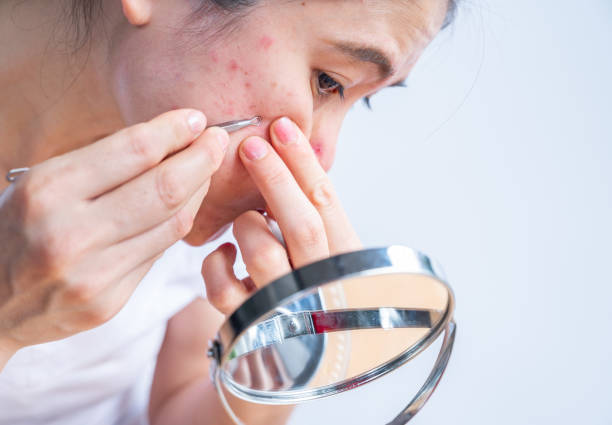Explanation of what a pimple is
A pimple is a type of skin lesion that is characterized by the presence of inflamed, raised bumps on the skin’s surface. Pimples are a common skin problem that affects individuals of all ages, but they are especially prevalent during adolescence due to hormonal changes. Pimples are caused by the blockage of hair follicles with dead skin cells and excess oil produced by the sebaceous glands. Bacteria on the skin can also infect these blocked follicles, leading to inflammation and the formation of pus-filled pimples.
II. Understand the Causes of Pimples
Explanation of how pimples form
Pimples form when hair follicles on the skin become clogged with dead skin cells and oil produced by the sebaceous glands. This leads to the formation of a plug or blockage in the follicle, which creates an ideal environment for bacteria to thrive. The immune system responds by sending white blood cells to the affected area, causing inflammation and redness. If the blockage is close to the surface of the skin, a whitehead will form. If the blockage is deeper, a blackhead or a more inflamed pimple will form.
III. Preventing Pimples
A. Skin care habits to prevent pimples
Effective skin care habits can play a crucial role in preventing pimples. Some of the essential skincare practices to prevent pimples include:
Cleansing
Regularly washing the face with a gentle cleanser can help remove excess oil, dirt, and dead skin cells that can clog pores.
Moisturizing
Moisturizing the skin with a non-comedogenic moisturizer can help keep the skin hydrated and prevent it from producing excess oil.
Exfoliating
Exfoliating once or twice a week can help remove dead skin cells, unclog pores, and prevent the formation of pimples.
Sun protection
Using broad-spectrum sunscreen can help prevent pimples caused by sun damage.
B. Lifestyle changes to prevent pimples
Certain lifestyle changes can also help prevent pimples from forming. Some of the essential lifestyle changes to prevent pimples include:
Eating a healthy diet
Consuming a diet rich in whole grains, fruits, and vegetables can help reduce inflammation and prevent pimples.
Exercise
Regular exercise can help reduce stress levels, boost circulation, and promote healthy skin.
Avoid touching the face
Touching the face can transfer bacteria, dirt, and oil to the skin, which can lead to pimples.
Managing stress
Stress can cause hormonal imbalances characteristics that can prompt pimples. Practicing stress management techniques such as meditation, yoga, or deep breathing exercises can help reduce stress levels and prevent pimples.
IV. Eliminating Pimples
A. Home remedies for pimples
Tea tree oil
Tea tree oil is a natural essential oil that has been shown to have antibacterial and anti-inflammatory properties, making it an effective treatment for pimples. To use tea tree oil, dilute a few drops in carrier oil such as coconut oil or jojoba oil and apply to the affected area using a cotton swab or pad. Isotroin 10 mg helps treat acne by reducing the production of a natural substance that causes acne. Tea tree oil ought not to be utilized undiluted as it can cause skin disturbance.
Aloe vera
Aloe vera is a plant that is commonly used in skincare products due to its anti-inflammatory and soothing properties. It can help reduce inflammation and redness associated with pimples while also promoting the healing of damaged skin. To use aloe vera for pimples, apply a small amount of the gel directly to the affected area and leave it on for 15-20 minutes before rinsing it off with water.
Honey
Honey is a natural ingredient that has antibacterial properties, making it an effective treatment for pimples. It can also help moisturize and soothe the skin. To use honey for pimples, apply a small amount of raw honey directly to the affected area and leave it on for 15-20 minutes before rinsing it off with water.
B. Over-the-counter treatments for pimples
Salicylic acid
Salicylic acid is a beta-hydroxy acid that is used to treat acne and unclog pores. It works by exfoliating the skin and breaking down the material that clogs pores, making it an effective treatment for blackheads and whiteheads. It also has anti-inflammatory properties that can help reduce redness and swelling associated with pimples. Salicylic acid is available over the counter in a variety of formulations, such as creams, gels, and pads.
Topical retinoids
Topical retinoids are a type of vitamin A derivative that is used to treat acne and promote skin cell turnover. They work by unclogging pores and reducing inflammation, making them an effective treatment for both inflammatory acne. Topical retinoids are available by prescription and come in a variety of formulations, such as creams, gels, and lotions.
C. Prescription treatments for pimples
Oral antibiotics
Oral antibiotics are prescription medications that are used to treat moderate to severe acne. They work by reducing the amount of acne-causing bacteria on the skin and by reducing inflammation associated with pimples. Commonly prescribed antibiotics for acne include tetracycline, doxycycline, and minocycline.
Topical antibiotics
Topical antibiotics are prescription medications that are used to treat mild to moderate acne. They work by reducing the amount of acne-causing bacteria on the skin and by reducing inflammation associated with pimples.
Isotretinoin
Isotretinoin, also known as Accutane, is a prescription medication that is used to treat severe nodular acne. Buy isotroin 10 mg online medication can diminish or clear severe acne and prevent new acne scars. It works by reducing the amount of oil produced by the skin, which can help prevent the formation of pimples. Isotretinoin

